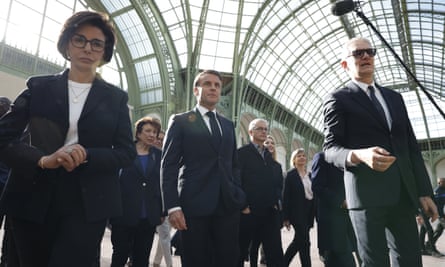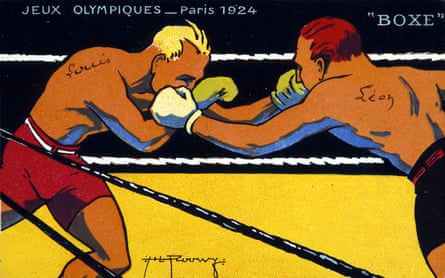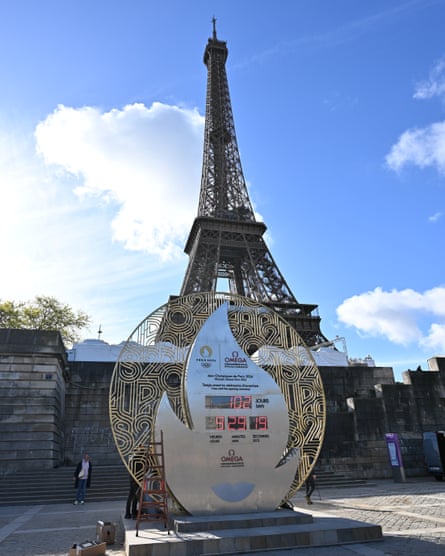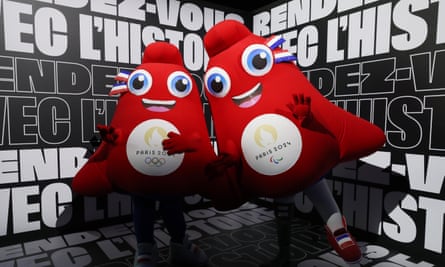In a live television interview under the steel and glass roof of Paris’s Grand Palais – the centrepiece of this summer’s Olympic Games – Emmanuel Macron set out his ambitions for the country’s athletes in much the same way he might outline a political manifesto.
They had one goal: to take enough medals to be among the Games’ top five Olympic and top eight Paralympic nations. He was putting pressure on them, he said last week – previously described as “healthy pressure” – but the goal was “absolutely attainable”.
The economics magazine Challenges reported Macron as going further, saying: “The success of these Olympic Games depends first and foremost on the success of our athletes.”
It was the French president in full Jupiterian mode – his nickname is the all-powerful, all-controlling Roman god – suggesting that, in sport as in politics, almost anything is possible with enough effort. The subtext was clear: it was not enough for the nation’s Olympians to be taking part; what would count was winning.
Sceptics pointed out that France had not reached the medals table top five since the 1948 London Olympics when it came third, but at a time when there were fewer top-level sporting nations. The sports data firm Gracenote backed Macron and predicted France would enjoy the traditional advantage of hosting the Games and take 55 medals, reaching fourth place.
Political pundits saw the national “how-many-medals” guessing game Macron had sparked as part of an Élysée operation to inject much-needed interest into the Olympics among a public that has, until now, been at best apathetic, at worst hostile.

Despite reassurances from City Hall that “daily life will continue”, Parisians have not been persuaded. The announcement of a “red zone” around Olympic sites in the city centre where residents will need documents to get to their homes, threats of public sector strikes, and a rise in the cost of public transport – along with the prospect of 15.3 million visitors, 15,000 athletes and 34,000 journalists – have made mobility not medals the issue.
Along the Seine last weekend, still flooded in places, the sun brought out locals and tourists alike on the pedestrianised streets that flank the river.
“It’s already packed here and the Games are weeks off. I don’t dare to consider what it will be like with millions of extra visitors,” said Anaïs, 38, a health administrator.
Emma, 20, a student, was in two minds. “The Olympics have created many summer jobs for students, which is good. But we have been advised to walk to work because the metro will be a nightmare.”
Pierre Rabadan, the former French rugby international heading City Hall’s Olympic team, is unfazed by the pessimism he hears at the public meetings he holds. “It doesn’t surprise me, given that 90% of things written about the Games are negative,” he said.
“We hear lots of questions and criticisms in the media, but we’re 100 days from the Games and we’ve gone from having no ability to stage them in 2015 to being ready, not only on time but on budget.”
The lack of public enthusiasm has been particularly surprising given the anger and bitterness that followed the International Olympic Committee (IOC) decision to give the 2012 Games to London rather than Paris. Standing outside City Hall on 6 July 2005 with the deeply disappointed crowd was not the time nor place to be an English journalist. Bertrand Delanoë, the then Socialist mayor of Paris, accused London’s bid team of breaking the rules and spirit of the Games. “We lost because we played fair,” he said.
Today, the London Games are viewed from across the Channel as a triumph, elements of which have served as a template for Paris 2024.

Paris hosted the Games in 1900 – four years after a Parisian, Pierre de Coubertin, had helped to resurrect them in Athens (they had been banned by Roman Emperor Theodosius I around AD393 – and again in 1924. From the moment the city was awarded the 2024 Games in September 2017, Paris City Hall has been on a quest to “revolutionise and reinvent” the event.
These will be the greenest Games, it claims, with the lowest carbon footprint thanks to the decision to limit the building of new structures and adapt what already exists for the 869 events. Several competitions will take place outside Paris in existing stadiums at Lyon, Saint-Étienne, Nice, Bordeaux and Nantes, while Marseille will host sailing events and Teahupo’o in Tahiti surfing competitions, spreading the geographical reach of the Games.
In Paris, the Grand Palais, which was built for the 1900 Universal Exhibition and has been closed since 2021 for renovations, will be used for fencing and taekwondo. Beach volleyball and Paralympic blind football will be held at the foot of the Eiffel Tower. The one-time parade ground at the 18th-century École Militaire will see judo, wrestling, Paralympic wheelchair rugby and para-judo, and the Trocadero gardens will mark the start and finish of road cycling races that will wind up and through Montmartre.
The esplanade at Les Invalides, the former military hospital home to Napoleon Bonaparte’s tomb, hosts the finish line of the marathons. Place de la Concorde, the square where Louis XVI and Marie Antoinette were guillotined, will be the stage for basketball, skateboarding, breaking and BMX competitions. The Palace of Versailles will host equestrian events and is on the marathon route.
Holding events outside stadiums is eco-friendly but a headache in terms of security, with France on its highest alert level after the Islamic State attack in Moscow last month. As a result, anyone entering a swathe of central Paris from eight days before the opening will be required to have registered for a QR code and show identity papers.
Up to 35,000 police and gendarmes will be mobilised across Olympic sites each day – 45,000 at the opening ceremony, reinforced by up to 22,000 private security agents and 18,000 soldiers from Sentinel, France’s ongoing security operation, and boosted by military personnel from 46 other nations.
Inside the security zone will be “the safest place in Paris”, Macron advised one worried viewer during last week’s television interview.
The opening ceremony, the first not to be held in a stadium, will involve a flotilla of boats carrying members of national teams along the Seine through the heart of the city. Spectator places have been reduced from about 600,000 people to just over 320,000 for security reasons. Last week, Macron said France had a “plan B and a plan C” if forced to cancel this open-air spectacle for security reasons.
after newsletter promotion

Another major concern is whether the Seine will be clean enough for the first time in a century for triathlon competitors to swim in. Recent tests for E coli suggested it will not. Rabadan says if heavy rain holds off, it should be, thanks to barrages set up to stop floating litter, controls on discharges from the more than 250 boats moored along the banks and a new overflow tank – the Austerlitz Basin – to draw off surface water from rain preventing it entering the river, which will be completed next month.
From July, the number of water sample sites will be more than quadrupled to identify pollution levels more accurately, but rain could force competitions to be delayed or cancelled. “When the sample results are good, swimming will be authorised. If they are not, there will be a ban on swimming,” Rabadan said. “This will be decided based on science.”
To inevitable ridicule, Macron offered further reassurance, saying he would be the first to take a dip in the cleaned-up river.
For visitors, the biggest bugbear has been the cost of accommodation during the Games. In the city’s bid, Paris hoteliers assured the IOC they would increase prices with moderation, a principle that has since gone out of the window. Hotel tariffs hit a peak last autumn and have begun to fall, but are still two to four times the usual rate. The manager of a three-star hotel in the north of the city explained it was charging over six times more than usual because: “You’re not paying for the room, you’re paying for the fact you’re in Paris during that period.”
A recent Ipsos poll suggested only 47% of French people thought the country capable of organising a successful Games and just 53% were interested in the event. Young people were found to be more enthusiastic than others.
With less than 100 days to go, the infrastructure has been delivered, 8m tickets sold and 45,000 volunteers recruited; Paris is ready to go.

“These will be French-style Olympics using our unique heritage to reinvent the Games. It will not only show who we are but also what we are capable of,” said a presidential spokesperson.
Officials are hoping that the arrival of the Olympic torch at Marseille on 8 May will ignite national enthusiasm. They suggested the negativity has been a reflection of the French public’s propensity for gloom and grumbling.
“The atmosphere of pessimism isn’t that surprising – it’s in the country’s DNA and, besides, it was the same elsewhere including in London 2012 which everyone uses as a reference,” one official said.
The final 250,000 tickets, half costing under €100 (£86), were snapped up within hours of going on sale last Wednesday in what Tony Estanguet, president of the Games organising committee, saw as a sign of growing interest. “We want the French to enjoy these Games. We want the stadiums to be full and we want the energy to be there behind the French athletes,” he said.
At a reception at the Élysée after France won 33 medals at the Tokyo Olympics, Macron told the national team their performance had been disappointing and the country “could do better”.
He may be hoping a record medal count and successful Paris Games will distract from his political woes, not least a predicted crushing defeat in June’s European election. Polls indicate that the governing Renaissance party will take only 17.5% of votes, way behind the far-right National Rally party with 32%.

But whether Olympic glory will reflect well on Jupiter is as uncertain as the medal tally. “By associating the honour of the nation with the number of medals, he has little to gain and everything to lose,” Philippe, 63, a retired executive and Paris resident, said.
Back at City Hall, Rabadan refuses to let the naysayers rain on his parade. “I see the public mood evolving in the meetings I attend,” he said. “At first the public was worried, even hostile, but over the last month we have seen people happy and proud to be hosting the Games.
“People are becoming fed up with all the negativity and pessimism. It’s a once-in-a-lifetime chance to create a festive and exceptional moment everyone will remember. Enthusiasm is rising.
“There will be constraints, but to welcome the world and do it in security and with successful organisation has not been easy in the current context. But it has been done – let the party begin.”
